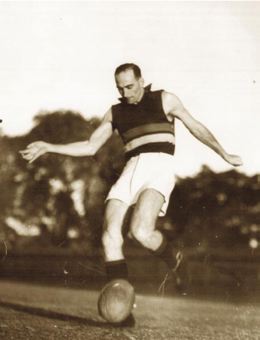|
HALL OF FAME INDUCTEE Deverick John Cronin |
|
|---|---|
| Year Inducted | 2006 |
| Date of Birth | 1st September 1911 |
Player: 1930-41
Games: 176 – 164 East Perth; 12 WA
Coached: East Perth 1941, 51-55, Western Australia 1951
Premierships: East Perth Captain 1936
Honours: Inaugural Tassie Medalist 1937 1937; East Perth Captain 1936-50; East Perth Fairest and best 1931; WAFL Umpire 1947-48; Umpired 1947 Grand Final; 1947 Australian Carnival in Hobart
While Deverick Cronin’s biography only records him as a player for 11 seasons, his passionate involvement with football lasted for nearly 50 years.
Known generally as Mick or DJ, he served the game as a player, coach, umpire and media critic – and he earned respect in all aspects.
The brilliant left-foot centre man joined East Perth in 1930 and was captain from 1936-40, leading the 1936 premiership team. His 12 State games saw him grab a slice of history at the 1937 Australian Carnival in Perth when he became the first winner of the Tassie Medal, presented to the Fairest and Best player.
Army service took Cronin away from football from 1942-46 and when he returned after World War II he took up the coaching role with East Perth’s colts, followed by two seasons in the ranks of WAFL umpires, officiating at the 1947 Australian Carnival in Hobart and then being the single umpire for the Grand Final.
In 1949 and ’50, Cronin coached juniors at South Perth and in 1951 he was appointed league coach at East Perth, taking on the State coaching role the same year.
There are many people who credit Cronin with moulding the East Perth team that Jack Sheedy inherited in 1956 and took to six consecutive Grand Finals, for three Premierships.
Young players like Graham Farmer, Ted Kilmurray, John Watts, Paul Seal, Kevin McGill and Tom Everett all got their football start with Cronin, but the astute veteran was happy to step aside for Sheedy, as he accepted the need for a playing-coach to take the squad to the next level.
Cronin then went on to carve out a remarkable career as a football critic, especially on Channel Seven’s World of Sport and as compare of the early telecasts of the Sandover Medal counts in the 1960’s.
He also became a hard-hitting newspaper critic, writing for the now-defunct Sports Review and his articles were often spot-on as far as the fans were concerned….but, still earning the respect of the players.



